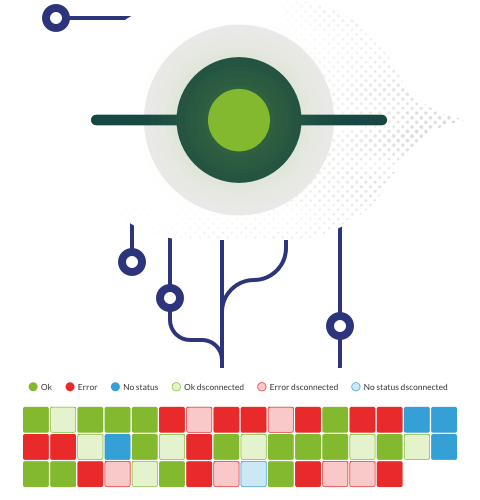The Y2K Effect: Was it true or just a technological hoax?
I am here to tell you a horror story. Something that will make you tremble from head to toe. It happened over Christmas and caused chaos among the gullible and conspirators.
A wicked Santa Claus? A contaminated consignment of cava? The closure of the Playmobil company? Nope! We are talking about the Y2K effect!
Young people will not remember that technological shock, but Y2K caused a lot of attention in all the media, and although on January 1st of that year it already suffered the disappointing hangover, the last day of December kept us on edge until the last minute.
The Y2K Effect
Yes, during all those last months of 1999 (Oh, the 90´s) the TV, the radio, the newspapers wouldn’t stop sending sparks and warnings: “Don’t leave your homes! Don’t take the risk! The world needs to update all its computers to avoid the total collapse that will occur at the end of this year! Then it turned out that when the whole family arrived at the New Year’s meal with a hangover asked if the planet had exploded, someone said, “Not Really”. Y2K went by without pain or glory as a macabre hoax to sell computers and to frighten old people and Skynet fans.
But you should know that the Y2K Effect was a real bug; it did not reach apocalyptic proportions as announced by the posters of screaming dooms at the exit of the subway, but it was an error caused by the programmers obsession to date only with two digits (00) to save memory. As you can imagine, or as it spread, when it reached January 1, 2000, gadgets all over the world would interpret the change as a restart of their innermost self, which would mean the year 1900 instead of 2000, causing a series of problems.
The end of humankind did not arrive, and even Leonard Nimoy signed up for hysteria and in 1998 already announced that it would be a catastrophe of biblical proportions. It was written in stone that the elevators would stop leaving you trapped in the middle, that the ATMs would start spitting bills and that the planes would explode in the air. From communications to the economic system, through the electricity that supplied the world, everything was controlled by machines, those that were meant to go crazy.
Many of the countries in the world, including Spain with some 420 million euros, took the time to update their systems to avoid the Y2K problem.
But the truth is that thanks to the money invested, the crisis could be solved and on day one we had nothing to worry about… To be honest there were quite a few Y2K-related incidents, including… shutdowns in fifteen nuclear reactors!
Many of the problems were seen as minor details and others were not related to the Effect because they did not occur at midnight. But the truth is that many of the programs were not active precisely at that time, so they presented the error simply when they were executed.
Some of the many bugs related or presumably related to Y2K:
- Ishikawa, Japan. A radiation monitoring team failed at midnight.
- Onagawa, Japan. An alarm sounded at an atomic power plant two minutes after midnight.
- United States. The naval observatory, where the main clock that marks the official time of the country operates, had an interference. Due to a scheduling problem, it announced that the date was January 1, 1910.
- United Kingdom. Credit card transactions were rejected or failed altogether while reciprocally working certain systems.
- Pennsylvania, United States. An elementary school library computer overcharged the students for borrowing books for 100 years.
These are just some of the most revealing cases recorded. In our beloved country, Spain, problems were also detected at two nuclear power stations, at petrol stations and in the traffic data collection system. But, as we have pointed out before, New Year’s Day passed without pain or glory. The fight was over and the crisis was saved. We all assumed that nothing had happened, that there was never any danger and that everything was a hoax scattered by little primary school children or by someone interested in the computer shop in our neighbourhood. But what if we simply avoided the Y2K problem because we were really preparing for it?
But let’s stay away from the failures of technology, let’s go to the benefits and the good results. There are programs, such as monitoring systems, that are unlikely to fail us on a worldwide scale on New Year’s Eve every millennium change. One of them is Pandora FMS.
The acronym FMS means “Flexible Monitoring System”
And why is it called like that? Because Pandora FMS is one of the most flexible monitoring software in the market. Pandora FMS is able to monitor devices, infrastructures, applications, services and business processes.
Nowadays there are many companies and organizations that have Pandora FMS. Do you want to know some of them and to read some of our success stories? Click here: https://pandorafms.com/pandora-customers/
Or you can also start from the beginning and get to know what Pandora FMS can do for you, here: https://pandorafms.com
And you can even send us any question you may have about Pandora FMS. And you can easily do it thanks to the contact form at the following address: https://pandorafms.com/contact/
Do not forget to leave a comment in the area below in the comments section, what did you think of this article? we want to hear your opinion. Have you ever heard of the Y2K Effect? Hopefully with this article, all your doubts have been answered.
And don’t forget to take a look at the other articles that have been posted on this blog. We’re sure you’ll like them a lot! They are very different and quite entertaining so don’t forget to take a look at them!
How did you experience The Y2K Effect? What were you doing when this happened? We want to hear your opinion, you know you can write it at the end of this article in the comments section.
Pandora FMS’s editorial team is made up of a group of writers and IT professionals with one thing in common: their passion for computer system monitoring. Pandora FMS’s editorial team is made up of a group of writers and IT professionals with one thing in common: their passion for computer system monitoring.


















